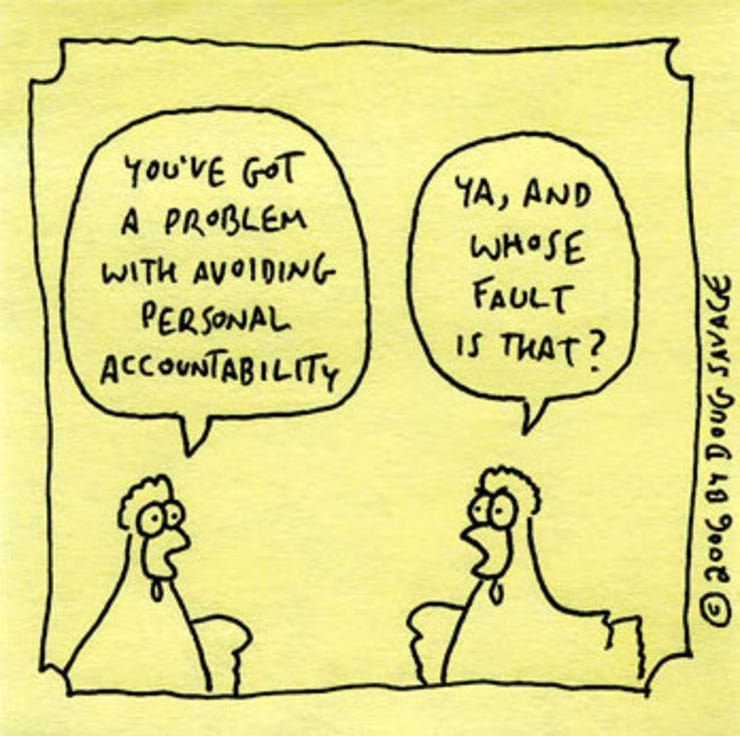The Intentional Organisation - Issue #43 - On Accountability
1. On Accountability.
A subtle line ties in large organisational transformation projects and the extensive discussions that are happening today about the return to work in physical offices. This line is about the role of accountability in an organisational setting.
Many significant organisational transformations fail because individuals don't feel accountable for change results.
The issue with remote work is that too many organisations (or rather, many managers) have not yet come to terms with handling the concept of individual accountability.
A big part of the problem in handling accountability in an organisational setting is linked to the fact that we tend to use the word interchangeably with the word responsibility. Even when run with a different meaning (like in a RACI matrix), there's still the underlying idea that responsibilities and accountabilities can be part of the same delegation process of organisational processes to individual roles.
Why is Accountability Different?
Accountability is different in a critical aspect.
Accountability is the acceptance, good or bad, of your personal actions that contributed to attaining or failing to meet an intended goal.
Following the above definition, we can see a critical differing aspect. Responsibility can be attributed to a person through a process of delegation. Accountability is instead about personal acceptance: individuals need to take an intentional act of acceptance of being accountable.
Traditional hierarchical power handling has created organisations where responsibilities are architected and planned carefully through formal delegation processes.
Yet, accountability is often much less present in most of these organisations. People tend to refuse responsibilities that are not formalised, actions that are not explicitly demanded initiatives that their line managers do not plan, and tasks that are not detailed in job descriptions.
The entire pandemic caused working-from-home experiment is essentially an Accountability Revolution. Why? Because it demonstrated how micro-management approaches don't work in that context, and many managers had to rely on the accountability of their teams to get things done. Almost a quantum leap for many.
Accountability is built on a foundation of trust and support, where employees are motivated to do the right thing and take responsibility when they do not. Something that can only come from a mix of self-interest and external push.
Building on such an Asset
Seeing management through the lens of accountability means having the tools to build new managerial processes from scratch. An example? Performance Management. Self-selection of goals and individual commitment makes it easier for employees to feel accountable rather than receiving them in a top-down model.
Another example is the OKR Model. Again, one of the key differences with the traditional MBO models is the team accountability that it tries to stimulate.
A third example can be Agile methods applied not only to software development but also to other areas of management: they all work thanks to ingrained levels of accountability.
Accountability as an Intentional Capability
It is easy to see why Accountability becomes such a critical capability for an Intentional Organisation. Clarity of goals and consistency of organisational assets constitute a fertile ground to develop accountability in individuals and teams.
But how do you nurture accountability? I believe this has become a key component of modern management and the basis for any self-management experiment. Feedback becomes a foundational element in creating constructive accountability, which you want to nurture as an organisation.
A Mindset Shift
What is critical to understand is that the world of "holding people accountable" is gone. The entire concept of developing accountability through command and control has never been working and shows an essential failure of traditional managerial models.
We need to honestly think of accountability as an enabler of intentional self-expression of the contributors to an organisation's success. In a world where people are constantly looking for a new meaning of Work in terms of self-realisation, accountability is what ties them to organisational purpose, becoming the basis of the organisational contract.
Sergio
Cover Photo by Adi Goldstein on Unsplash
2. My Latest Posts
3. Reading Suggestions
4. The (un) Intentional Organisation 😁
Source: Pinterest
5. Keeping in Touch
Don’t hesitate to reach out, either by hitting “reply” to this newsletter directly or using my blog’s contact form.
I welcome any feedback, both on this newsletter and, in general, on the content of my articles.
Find me also on:



